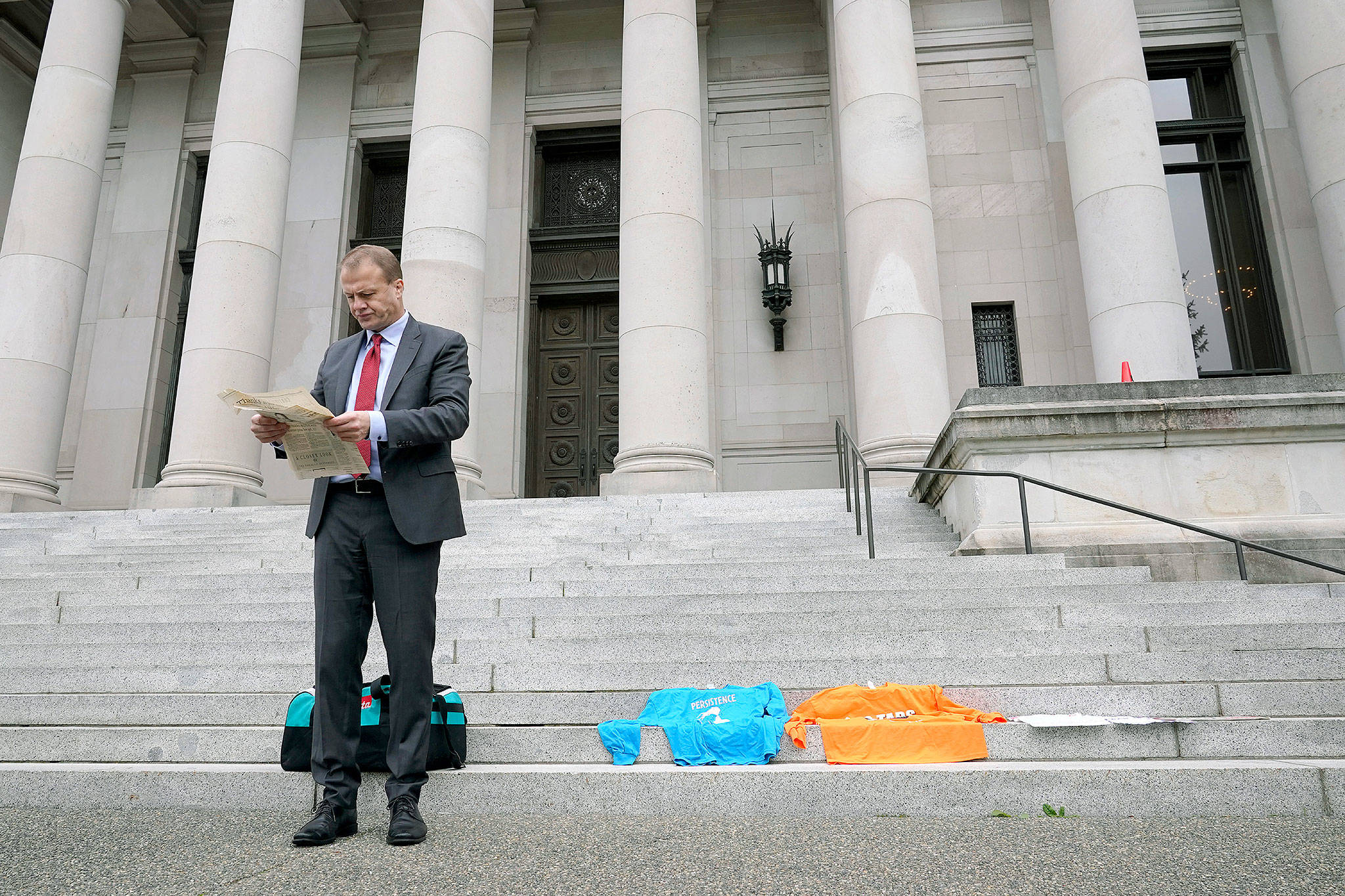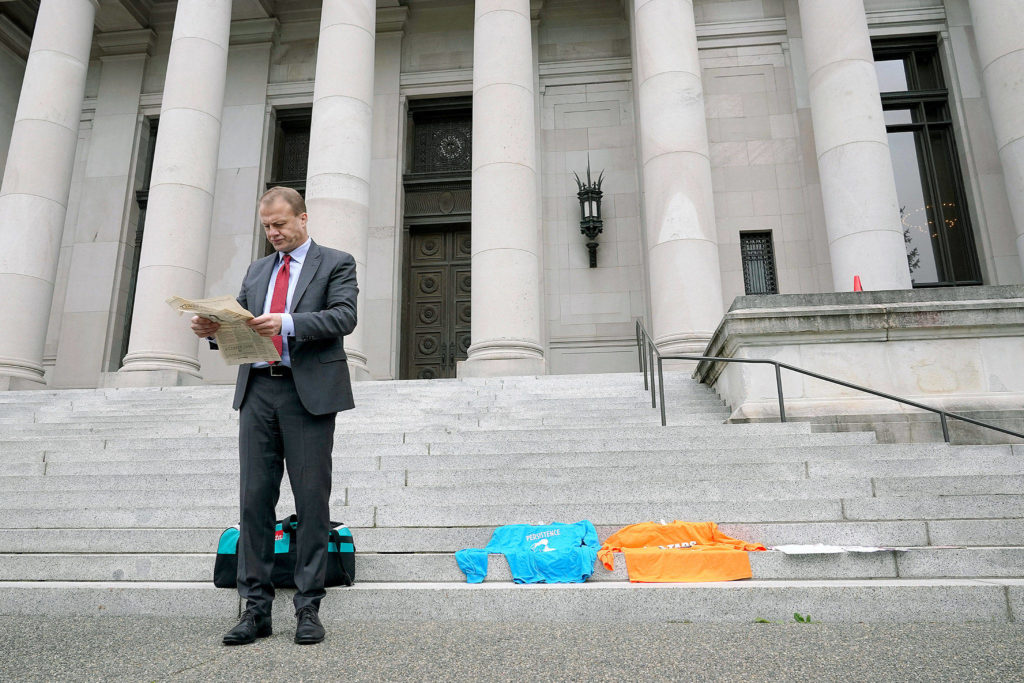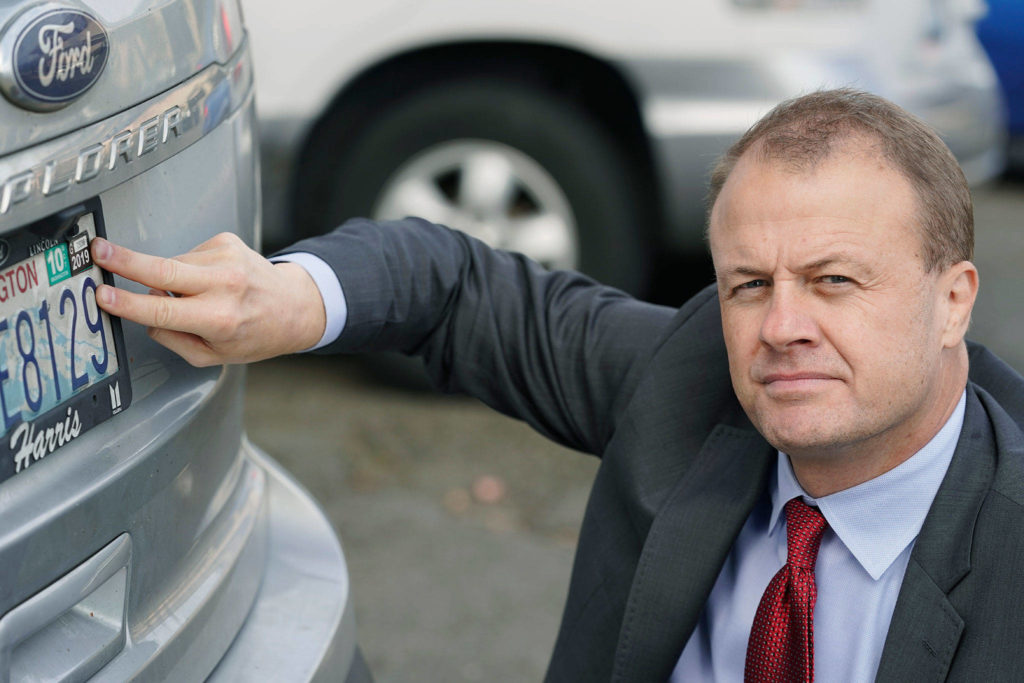OLYMPIA — A unanimous state Supreme Court on Thursday struck down the $30 car-tab initiative passed by voters in 2019.
Justices said Initiative 976 violated provisions of the state Constitution limiting the scope of ballot measures to no more than one topic. Eight of nine justices also concluded the subject of I-976, as described on ballots, was unconstitutional because it misled voters.
“The people of our state have the power to propose and approve legislation,” Justice Steven Gonzalez wrote for the majority. “When the people act in their legislative capacity, they are, like any other legislative body, bound by constitutional constraints.”
The initiative, Gonzalez continued, “contains more than one subject, and its subject is not accurately expressed in its title. Accordingly, it is unconstitutional.”
The ruling comes nearly a year after 53% of state voters — including 58.2% in Snohomish County — approved I-976, which, like previous car-tab-limiting measures, was the handiwork of serial initiative promoter Tim Eyman.
“When this ruling came down, I just got angry. I just got furious,” Eyman told reporters at a news conference outside the Supreme Court building Thursday. “The voters of the state are right to be angry. They are right to be outraged. Your vote should count but didn’t count because nine justices on the court said voters were confused, and I know that they weren’t.”
This marked the third time an Eyman initiative to cap vehicle registration fees and ax the motor vehicle excise tax collected by Sound Transit was approved on an election day — only to be derailed later by the state’s high court.
Eyman said he’d do a fourth one “in a heartbeat,” but said the onus now should be on Gov. Jay Inslee and the Legislature to carry out the will of the electorate. He said changes sought in the initiative should be put into law either during a special session or the next legislative session.
“You do initiatives to prove voters are on your side,” he said. “I’ve proved it three times.”
Thursday’s decision immediately eased a headache for lawmakers and the governor with the state’s transportation budget.
They worried for months that, if I-976 were to be upheld, it would slash revenue by $422 million for the current budget and $660 million in the next two-year spending cycle that begins July 1, 2021. Inslee had ordered car tab receipts be collected but not spent, in case the money had to be returned.
“There are still challenges,” cautioned state Sen. Steve Hobbs, D-Lake Stevens, chairman of the Senate Transportation Committee.
Gas tax receipts and toll revenue are down as the economy has slowed during the pandemic. And the state’s multibillion-dollar obligation to replace culverts remains, he noted.
“This makes it a little easier,” Hobbs said of the ruling. “It looked like it was going to be a real sucky budget. Now it will be less sucky.”
Everett Mayor Cassie Franklin lauded the result.
“I-976 dealt a major blow to the city’s already strained revenue streams, eliminating millions per year in funds we use to keep our roads safe and well-maintained, as well as support for our paratransit services,” she said in a statement. “We appreciate this ruling and will evaluate what it means for our city.”
I-976 sought to eliminate vehicle-license charges levied by local transportation districts in Everett, Lynnwood and 60 other cities.
It also called for slashing the motor vehicle excise tax collected by Sound Transit, a pivotal source of revenue for voter-approved expansion known as ST3, including the extension of light rail to Everett. The initiative also aimed to force the regional transit authority to retire or refinance some outstanding construction bonds and switch to using vehicle values in Kelley Blue Book when calculating the Sound Transit excise tax.
Even before the results were final a year ago, a coalition of transit agencies and local governments — led by the city of Seattle and King County and including tiny Garfield County’s transit agency in southeast Washington — challenged I-976’s legality in court. The Washington State Transit Association, whose members include Sound Transit, Community Transit and Everett Transit, and the Association of Washington Cities, which includes many in Snohomish County, were part of the coalition.
A lower court, and later the state Supreme Court, ordered the measure not be implemented until resolution of the legal challenge. The lower court upheld most of the initiative as constitutional.
At a June hearing, several Supreme Court justices seemed concerned about whether the measure’s title misled voters and the content covered too many subjects.
There were questions about the assertion of the ballot title that the measure would “limit annual motor-vehicle-license fees to $30.” In actuality, the lowest fee would be $43.25 because certain charges imposed by the state Department of Licensing were not covered in the initiative and continue to be collected.
State attorneys said the notion of $30 car tabs has been debated for a long time and voters understand it as a political characterization synonymous with paying lower vehicle registrations fees. Opponents countered that the law doesn’t allow for political phrases in ballot titles.
Opponents of the initiative also argued the wording could lead voters to think that taxes approved in the past would not be affected, when in fact they would.
Gonzalez, writing for the majority, sided with challengers on every point. He called the text “deceptive and misleading since the average informed lay voter would conclude voter approved taxes — such as those used to fund local and regional transportation projects across our state — would remain.”
On the critical issue of multiple topics, Gonzalez zeroed in on the section concerning Sound Transit bonds and concluded the direction to act on the bonds “is not germane” to the measure’s purpose of limiting vehicle taxes and fees. Thus, he wrote, it is an unconstitutional second subject.
“We knew this initiative had some fairly obvious legal problems from the outset.” said Seattle City Attorney Pete Holmes in a statement. “Mr. Eyman has never sponsored an initiative that’s withstood legal challenge, so today’s decision shouldn’t come as a surprise to anyone. The court rightly recognized that a clearly inaccurate initiative title and log-rolling subjects is unlawful.”
Under state law, the Office of the Attorney General is responsible for defending voter-approved ballot measures against legal challenges. Eyman, Pierce County and other individuals backing the initiative were allowed to intervene in the initiative’s defense.
“To be candid, we knew this would be a difficult case,” Attorney General Bob Ferguson said in a statement. “Tim Eyman has never written a successful tax initiative that passed legal muster.
“Tim Eyman will, of course, do what he has done throughout this case — blame everyone but himself,” Ferguson continued. “He will again blame my office for language in the ballot title that he specifically requested to be included in the title, and that was pulled word-for-word from his initiative. He should look in the mirror and apologize to voters for once again sending them an initiative that failed to survive a legal challenge and deliver on its promises.”
Rep. Jim Walsh, R-Aberdeen, said Ferguson should be “shame-faced” by the outcome.
Appearing with Eyman, Walsh said Ferguson’s office bumbled arguing the case in front of the high court. While Walsh said he wasn’t confused by the title, it fell to Ferguson’s office to draft the final language.
“It is a bad day for Bob Ferguson,” Walsh said. “He has failed the people of Washington.”
The court ruling can be found online at courts.wa.gov. The case is Garfield County Transportation Authority, et al., v. State of WA, et al.
Jerry Cornfield: 360-352-8623; jcornfield@heraldnet.com. Twitter: @dospueblos.
Talk to us
> Give us your news tips.
> Send us a letter to the editor.
> More Herald contact information.



























